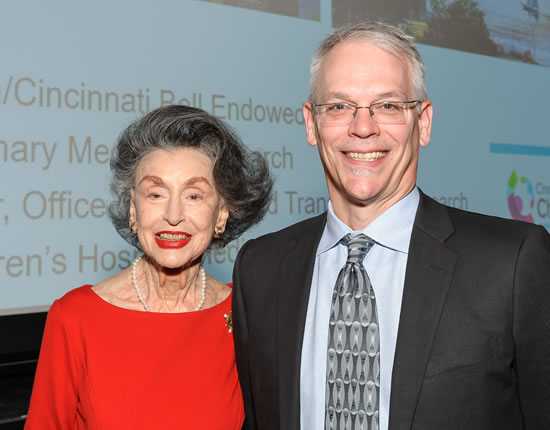Cystic Fibrosis Foundation Gives 39th Lecture in Memory of Stephanie Kossoff at Columbia Presbyterian
By Jon Paul Clancy, MD, Professor of Pediatrics, Division of Pulmonary Medicine, Cincinnati Children’s Hospital Medical Center

Phyllis L. Kossoff & Professor Jon Paul Clancy
Cystic fibrosis (CF) is a progressive genetic disease found in about 30,000 people in the U.S. CF is caused by mutations in the gene that produces the cystic fibrosis transmembrane conductance regulator (CFTR) protein. This protein is responsible for regulating the flow of salt and fluids in and out of the cells in different parts of the body. In people with CF, mutations in the CFTR gene can disrupt the normal production or functioning of the CFTR protein found in the cells of the lungs and other parts of the body. Mutations in the CFTR gene cause the CFTR protein to malfunction or not be made at all, leading to a buildup of thick mucus. In the lungs, the mucus clogs the airways which in turn leads to persistent lung infections. In the pancreas, the mucus prevents the release of digestive enzymes that allow the body to break down food and absorb vital nutrients resulting in malnutrition and poor growth. Complications of mucus buildup can occur in other organs including the liver and reproductive tract.
Breakthrough treatments have added years to the lives of people with cystic fibrosis. Advances in antibiotic, physical and nutritional therapy have helped control infections and improve growth. The first drug targeting the basic genetic defect in CF was approved in 2012. The development of this group of drugs signals a historic breakthrough in how CF is treated. Today the median predicted survival age is close to 40. This is a dramatic improvement from the 1950s, when a child with CF rarely lived long enough to attend elementary school.
The focus of our laboratory is to understand how mutations in CFTR lead to disease, how defective CFTR activity can be restored, what factors limit restoration, and how we can monitor CFTR and CF disease in vivo. This is accomplished through i) the development of novel patient-based outcome measures (such as the lung clearance index, nasal potential difference and intestinal current measurements) to detect restored CFTR function, ii) use of preclinical model systems derived from CF patients to predict patient responsiveness to interventions, iii) banking and distribution of biospecimens obtained during clinical care and clinical research, and iv) novel imaging modalities such as pulmonary perfusion, UTE MRI and hyperpolarized gas imaging of ventilation. I provide oversight to the entire CF research program at CCHMC, which encompasses research at the cell, animal model, and patient level. I currently provide primary scientific mentorship to three junior faculty members (two with current extramural training awards), and I have mentored 20 fellows and junior faculty who have gone onto successful academic careers. I am the Medical Director of the Office of Clinical and Translational Research at CCHMC, which provides broad-based support to investigators engaged in clinical trials and research translation. I also serve in several leadership positions for the Cystic Fibrosis Foundation, and I am the DSMB Chair of two NIH funded protocols. My institutional goal is to promote a research environment that allows junior faculty to mature and succeed. #
Mrs. Phyllis Kossoff, the mother of Stephanie Kossoff, founded the research program to honor her daughter who became ill while a student at Barnard College.
